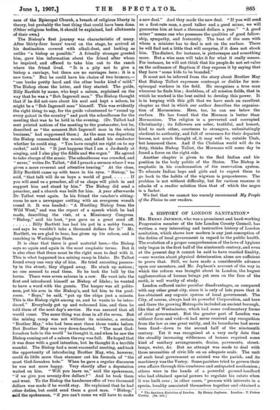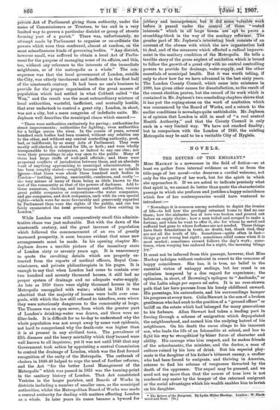A HISTORY OF LONDON SANITATION.*
Mn. HENRY JEPHSON, who was a prominent and hard-working Progressive member of the late London County Council, has written a very interesting and instructive history of London sanitation, which shows how modem is any just conception of the duties of local government in regard to the public health. The evolution of a proper comprehension of the laws of hygiene only began in the first half of the nineteenth century, and even at the present day it cannot be said to have reached finality, —our worries about physical deterioration alone are sufficient to prove that. Still, we have made a considerable advance upon our ancestors, and Mr. Jephson's account of the way in which the reform was brought about in London, the hugest agglomeration of human beings yet seen on the face of the earth, is well worthy of study.
London suffered under peculiar disadvantages, as compared with any other great city, since it is only of late years that it has obtained any organic system of local government. The City, of course, always had its powerful Corporation, and here and there the growing Metropolis included an ancient borough, like that of Westminster, which had some rudimentary forms of civic government. But the greater part of London was without form and void—it had never received any recognition from the law as one great entity, and its boundaries had never been fixed—down to the second half of the nineteenth century. Yet it was recognised at a very early date that the steadily increasing wilderness of houses required some kind of sanitary arrangements, drains, pavements, street. lamps, water, &c. But no attempt was made to deal with these necessities of civic life on an adequate scale. The unit of such local government as existed was the parish, and its machinery was the Vestry. Some parishes tried to govern their own affairs through this cumbrous and antiquated mechanism ; others were in the hands of a powerful ground-landlord who had obtained special powers to regulate his estate when it was built over ; in other cases, "persons with interests in a specie, locality associated themselves together and obtained a
• The Sanitary Evolutional London. By Henry Jeplanon. London T. Fisher (Os. net.] Act of Parliament giving them authority, under the name of Commissioners or Trustees, to tax and in a very limited way to govern a particular district or group of streets forming part of a parish." There was, unfortunately, no attempt made by Parliament to organise or co-ordinate the powers which were thus conferred, almost at random, on the most miscellaneous kinds of governing bodies. c Any district, however small, was suffered to obtain a local Act of Parlia- ment for the purpose of managing some of its affairs, and this, too, without any reference to the interests of the immediate neighbours, or of the metropolis as a whole." The con- sequence was that the local government of London, outside the City, was utterly incoherent and inefficient in the first half of the nineteenth century. It had been no one's business to provide for the proper organisation of the great masses of population which had settled in what Cobbett called "the Wen," and the result was the most extraordinary mixture of local authorities, wasteful, inefficient, and mutually hostile, that ever undertook to control a great city ; London, in short, was not a city, but a mere congeries of indefinite units. Mr. Jephson well describes the municipal chaos which ensued:— " There were authorities exclusively for paving ; authorities for street improvements; authorities for lighting; even authorities for a bridge across the river. In the course of years, several hundred such bodies had been created, without any relation one to the other, and without any central controlling authority, good, bad, or indifferent, by as many Acts of Parliament. They were mostly self-elected, or elected for life, or both ; and were wholly irresponsible to the ratepayers, or indeed to any one else; nor were their proceedings in any way open to the public. Many of them had large staffs of well-paid officials ; and there were perpetual conflicts of jurisdiction between them, and an absolute want of anything approaching to municipal administration. It has been roughly stated—roughly because there are no reliable ggures—that there were about three hundred such bodies in rondon—• jostling, jarring, unscientific, cumbrous, and costly '— the very nature of many of them being as little known to the rest of the community as that of the powers of darkness. Add to these numerous, clashing, and incompetent authorities, various great publics companies or corporations—the water companies. and gas companies, and dock companies, each with its own special rights—which were far more favourably and generously regarded by Parliament than were the rights of the public, and one has fairly enumerated the local governing bodies then existing in London?'
While London was still comparatively small this adminis- trativeschaos was just endurable. But with the dawn of the nineteenth century, and the great increase of population which followed the commencement of an era of greatly increased prosperity, it soon became evident that some new arrangements must be made. In his opening chapter Mr. Jeplison draws a terrible picture of the insanitary state of London sixty or seventy years ago. It is unnecessary to quote the revolting details which are properly ex- tracted from the reports of medical officers, Royal Com- missioners, and private philanthropists in his pages. It is enough to say that when London had come to contain over two hundred and seventy thousand houses, it still had no proper system of drainage and no adequate water-supply. As late as 1850 there were eighty thousand houses in the Metropolis unsupplied with water ; whilst in 1841 it was admitted that the majority of houses were built over cess- pools, with which the law still refused to interfere, even where they were notoriously dangerous to the community at large. The Thames was an open sewer, from which the greater part of London's drinking-water was drawn, and there were no filter-beds. It is difficult for us to-day to understand why the whole population was not swept away by some vast epidemic, not hard to comprehend why the death-rate was higher than it is at present in any civilised town. The prevalence of filth diseases and the heavy mortality whiCh tbercansed were well known to all inquirers; yet it was not until 1848 that any Government took action by appointing a central Commission to control the drainage of London, which was the first formal recognition of the unity of the Metropolis. The outbreak of cholera in 1848-49 helped to urge the need of further reforms, and the Act "for the better Local Management of the Metropolis" which was passed in 1855 was the turning-point in the sanitary history of London. That Act constituted Vestries in the larger parishes, and Boards of Works in districts including a number of smaller ones, aa the municipal authorities, whilst the Metropolitan Board of Works was made a central authority for dealing with matters affecting London as a whole. In later years its name became a byword for jobbery and incompetence, but it did. some valuable wirl before it passed under the eontrol of these "vested interests" Which in all large towns are 'apt to prove a stumbling-block in the way of the sanitary reformer. The greiter inirt of Mr. Jephson's interesting hoc& consists of an account of the abuses with which the new organisation had tO deal, and of the nieaaures which effected a radical improve- ment in the sanitary condition of the Metropolis. He tells a terrible story of the gross neglect of sanitation which is bound to 'follow the growth of a great city with no central controlling powers to provide for drainage, water-supply, and the 'other essentials of municipal health. 'Bet it was worth telling, if only to show how far we have advanced in the last sixty years. The London County Council, which came into existence in 1889, has given other causes for dissatisfaction, as the result of the recent eleCtiOn proves, but the record of its work which is contained in Mr. Jephson's two concluding chapters shows that it has put the coping-stone on the work of sanitation which was commenced by the Board of Works, and a return to the earlier conditions is nowadays quite unthinkable. Mr. Tephson is of opinion that London is still in need of "a real central Health Authority," and that the County Council is only such in a very limited 'Way. We have not reached finality; but in comparison with the London Of 1840, the existing Metropolis may be said to be a veritable City of Hygiela.







































 Previous page
Previous page